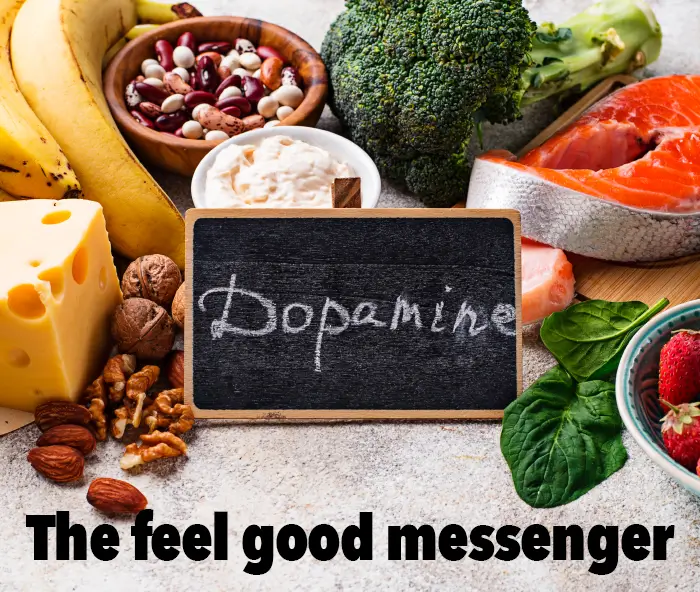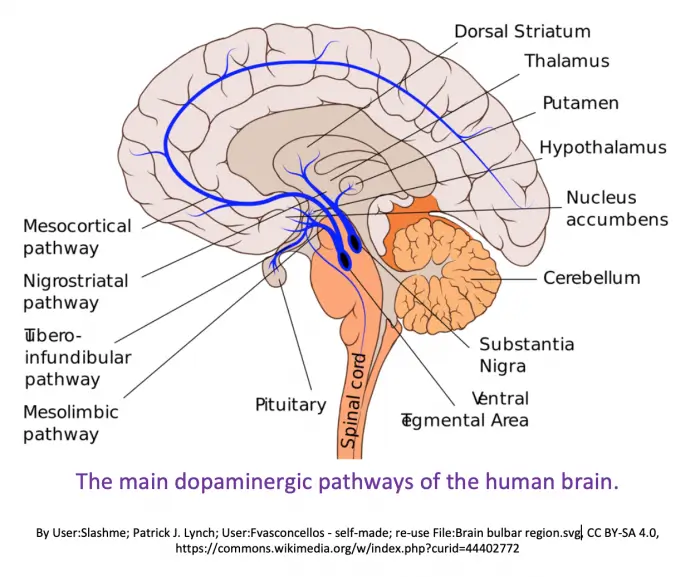
Dopamine (DA) is the most abundant neurotransmitter of all the catecholamines in the human brain; it acts as a chemical messenger/signaling between neurons and is involved in reward-incentive-motivational pathways as well as in response to aversive stimuli (Fiori et al., 2018). You can call it the “feel-good hormone.”
Dopamine is synthesized in a specialized network of nerves called Dopaminergic pathways, also called dopaminergic projections.

Dopamine mediates a variety of physiological functions and modulates many behavioral states. When not functioning correctly, some of the signs may show as an impaired motivation to fulfill tasks or, more deeply, may present in depression episodes.
As a neural pathway, these nerves are involved in many body functions:
Blood flow, digestion, executive functioning, memory and focus, mood and emotions, motor control, pain processing, insulin regulation, etc. Dopamine doesn’t work alone; it does it along with other neurotransmitters such as serotonin and adrenaline.
When there is a problem with dopamine, symptoms include difficulty concentrating or poor coordination, movement difficulties, and reduced alertness. On the other hand, when you have too much dopamine, there will be issues with delusions, addiction, weight problems or some mental issues.
Dopamine interacts with other neurotransmitters and hormones, so when there are problems with testosterone, estrogen, or glucocorticoids, issues may show as cognitive problems, especially in adolescence and even into adulthood.
Dopamine is made from the amino acid Tyrosine which, in turn, is converted to the precursor Dopa in nerve tissues. Dopamine is then produced in the substantia nigra, ventral tegmental area, and hypothalamus of the brain.
From the nutrition standpoint, eating foods that are a source of tyrosine would be an important action step for people with dopamine deficiency. Some of these foods are grass-fed (and finished) meats, pasture-raised poultry and eggs, and wild-caught fish. Also, nuts and seeds.
The conversion of tyrosine depends on many nutrient co-factors, so besides the above, a well-balanced diet rich in micronutrients should be followed. Tyrosine needs Vitamin B6, folate, and copper to be converted into neurotransmitters.
Supplementing with L-Tyrosine may also be helpful, especially if protein intake from animal sources is an issue.
To prevent dopamine depletion, avoiding excessive amounts of refined sugars and processed saturated fats is a good idea.
Enough Sleep: keep your internal clock system in good working order with a consistent bedtime and wake time every day.
Exercise: noradrenaline, serotonin, and dopamine are all modulated by exercise
Mindfulness practice: meditation and yoga increase dopamine levels. Being kind also sends reward signals to the brain
Supplements that may be helpful:
Vitamin D
Probiotics
Curcumin
Mucuna pruriens
Reference:
Fiori, L. M., Lin, R., Ju, C., Belzeaux, R., & Turecki, G. (2018). Using Epigenetic Tools to Investigate Antidepressant Response. In Progress in Molecular Biology and Translational Science (Vol. 158, pp. 255–272). Elsevier. https://doi.org/10.1016/bs.pmbts.2018.04.004



